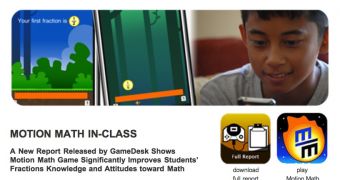The results of a study conducted by Prof. Michelle Riconscente from the University of Southern California in partnership with GameDesk may act as evidence iPads are key to boosting student math skills.
The study, labeled as experimental, was conducted to determine whether Motion Math, a fractions game designed for Apple’s iDevices, can improve students’ response to fractions.
The results of the study were published by GameDesk whose members acknowledged that knowing your fractions from a young age is essential if you want to sink your teeth into the subject later on.
Yet the vast majority of US students fail to become proficient in fractions, the group points out, citing national data.
So what they did was they “applied a repeated measures crossover design to experimentally study the effectiveness of Motion Math for improving students’ fractions knowledge and attitudes.”
122 fifth graders from two schools and four math classes participated in the study.
When the results came in, GameDesk saw that the students’ fractions test scores improved an average of over 15% after playing Motion Math for 20 minutes daily over a five-day period.
This represented a significant increase compared to a control group, said GameDesk.
“Students’ self-efficacy for fractions, as well as their liking of fractions, each improved an average of 10%, representing a statistically significant increase compared to a control group,” said the organization whose focus is to help close the achievement gap and to engage low-proficient students in science, technology, engineering, and math learning
Pretty much every student loved the activity that involved Apple’s iPad and they reported wanting to play it again. 95% were so into it that they confidently said their friends would like the game as well.
Many also downright acknowledged that “the game helped them learn fractions,” added GameDesk.
“This study offers important evidence that what students learn through gameplay can help them perform better on the kinds questions asked on state and national standardized tests,” reads the report.
“In just five days the app shifted the needle on student’s understanding of a topic that has long eluded most learners. Moreover, it shows that gameplay can boost kids confidence and enthusiasm for academic subject matter. Taken together, the data from this experimental study offer strong evidence that Motion Math successfully integrates entertainment value with educational value.”

 14 DAY TRIAL //
14 DAY TRIAL //